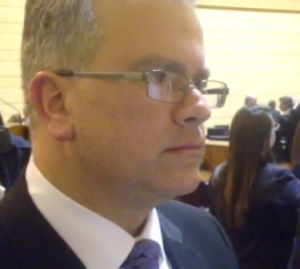 I saw my friend Jeff yesterday morning, on the way to his morning workout at the YMCA. Jeff is confined to a wheelchair, and uses RIPTA to get to the East Side Y most mornings. We chatted for a few minutes while we got on the same bus and shared it through the bus tunnel.
I saw my friend Jeff yesterday morning, on the way to his morning workout at the YMCA. Jeff is confined to a wheelchair, and uses RIPTA to get to the East Side Y most mornings. We chatted for a few minutes while we got on the same bus and shared it through the bus tunnel.
Because I commute via RIPTA, I walk through Kennedy Plaza pretty much twice a day, every day. In a couple of decades of riding the bus, early, late, middle of the day, I have never felt unsafe in the plaza. Now and again I’ve been asked for change, which I decline to give, and once or twice I’ve been offered bags of drugs, which I decline to buy. I’ve occasionally seen loud arguments and even a couple of altercations, but they were not my arguments and altercations. People loiter, but after all, how different is that from me waiting for my bus? I see other people carrying on their lives in the Plaza, just as I’ve shared the bus with some people for years, and am familiar with a little slice of their lives. Their lives are not mine, so we coexist, but seldom interact.
Joe Paolino talks blithely about moving the buses to the Peter Pan station, or to Allens Avenue. He can do that because he never takes the bus, but has a driver to drop him off wherever he wants to go. If he gets what he wants, the rest of us who do not enjoy that luxury will have longer commutes, get wetter when it rains, and miss connections, in service of enhancing the value of his property.
Does anyone beside me remember the people who used to hang around the Fogarty building on Fountain Street in downtown Providence when the unemployment office was in it years ago? I’m not so old that I could possibly be the only one, am I? Or at the bus station on Sabin Street before that? What about the people who would crowd around Travelers Aid (now Crossroads) off Westminster? The bus station, Crossroads, and the unemployment offices have all been moved out of downtown, to keep “those people” away.
Now city leaders have set their sights on RIPTA, suggesting that the bus system is somehow a magnet for poor people and thus a threat to an upscale downtown, just like those other magnets. This is a familiar tune, but why do we keep singing it? Paolino himself was the mayor who presided over moving the bus station from Sabin Street to its current remote location off I-95 back in the 1980s. Did that help? Moving these other supposed magnets out of downtown has not worked in the past. Why should anyone imagine it will do the trick this time?
The problem in Kennedy Plaza is not RIPTA, and pretending so will not solve anything, but only cause hardship and inconvenience to people whose lives are already marked by hardship and inconvenience. The problems are social problems of drugs, poverty, and homelessness, unmasked by the evacuation of workers from downtown. Abetted by state policy, and with transportation to downtown increasingly less convenient (RIPTA cutbacks anyone?), banks, law firms, and other commerce has left downtown. The state itself has removed hundreds of its employees, too. The poor people who congregate in Kennedy Plaza are not new; they are just the ones left behind.
Back before the state decided to evacuate its workers from downtown, there was a substantial presence downtown by social service agencies. In service of enhancing property values and chasing away the poor people who they “attracted”, those agencies were moved out of downtown. Now there is little or nothing downtown to help people who need it, but the people are still there. How strange.
Moving these problems out of the center of town will not make them go away, but only allow our civic leaders to pretend they do not exist. Do we want to solve those problems, or just ignore them? Wait, don’t answer that.
]]>Soon after Mr. Mateen first opened fire, he was confronted by an armed security guard who was an off-duty police officer, said John Mina, the Orlando police chief, at a news conference Monday morning. They exchanged gunfire. The security guard was then joined by an unknown number of police officers, the first to arrive on the scene.
In other words, the gunman’s actions were immediately met with an armed response. Did it help?
]]>In a stunning turnaround, the RI Tea Party today made a full-throated endorsement of some of the most intrusive government regulations on the books. In a fundraising email, the group called on its supporters to “…rise up against this assault on everything you’ve worked your entire life to earn” — by defending existing zoning and land-use regulations throughout the suburban and rural parts of our state.
For years, suburban communities in Rhode Island (and elsewhere) have stood firmly against affordable housing through land use regulations demanding such things as minimum lot sizes, height restrictions, and prohibitions on multi-family housing. Making it perfectly clear that land-owners’ rights to property are not absolute, these zoning regulations set very clear limits on what can and cannot be built on a piece of land, the key reason it is such a surprise to see these restrictions endorsed by the RI Tea Party and other “property rights” defenders.
There is demand for affordable housing in almost every community in Rhode Island. Were the housing market a free market, it would be built, and there would be affordable housing all over the state. But in the suburban and rural communities, local land use regulations often prevent such housing from being built anywhere in town.
A sensible state would not throw out land use regulation — building codes and zoning regulations exist for a good reason — but would recognize when those rules and regulations had been used in ways that encourage segregation and make finding affordable places to live so difficult.
This is exactly what RhodeMapRI proposes — in the very passage the RI Tea Party quotes in their fundraising email shown here — and perhaps is why the plan enrages them so. Apparently they prefer the old restrictions on market forces to new ones.

Rumor had it that this endorsement would have come out a week or two ago, before the RhodeMapRI plan was approved by the RI Planning Council, but that there were delays in filing the paperwork necessary to renounce the group’s previously held pro-market, anti-regulation, views.
For the RI Tea Party to endorse the status quo of zoning regulation was a surprise for many local observers. As one put it, “It’s really remarkable how flexible they are. It’s almost as if the political philosophy they espouse is just a cover for, well, something else.”
Another man on the street said, on the contrary, it was laudable for the group to be flexible about the government regulations they hated. “It’s the mark of a sophisticated mind that it can believe two completely contradictory ideas at the same time. Somebody smart said that once, wasn’t it Socrates or George Washington or someone like that?” He went on to say, “It’s like Mitch McConnell running against Obamacare in Kentucky while endorsing, and even defending, KyNect, Kentucky’s popular Obamacare exchange. If that kind of flexibility is good enough for Mitch McConnell, it’s good enough for the RI Tea Party!”
A random woman accosted on the street said, “Let go of me!”
]]>
In yet another breathless press release from The Center for Freedom and Apple Pie today, I learned that the controversial RhodeMapRI plan will call for the incineration of your house. Right down to the ground.
Be afraid. Very afraid.
Yes, it’s true, your nice comfortable suburban house, the one you dreamed about for years, is to be sacrificed to build an affordable housing skyscraper in its place. The plan calls for you to be offered a semi-private apartment, since private apartments are to be phased out. But you won’t mind sharing the kitchen and bathrooms with your less fortunate neighbors. After all, you’ll be commuting together on public transportation, since the RhodeMapRI also envisions the end of private automobiles. Your car is to be taken via eminent domain and resold to UN bureaucrats, with the proceeds made available to help keep the subsidized birth-control vending machines full in the lobby of your new home.
For those late to this party, the Center for Freedom and Apple Pie has warned all of us about the impending danger to the state posed by “RhodeMapRI” an insidious plan to end capitalism hatched within the bowels of the Rhode Island Division of Planning. The official Rhode Island Tea Party similarly warns of the terrible peril, as do totally-100%-they-promise unaffiliated citizens like Colleen Conley and Gary Morse.
Just in time these citizen activists have alerted us to the dangers within. The jack-booted planners ensconced in a Smith Hill building made of — can you imagine! — pink marble, have gussied up their world-domination plans with such appealing catch-phrases as “sustainable development” and “affordable housing.” You might think their economic development plan looks like an appealing alternative to the plans of the past. You might be distressed that “economic development” has always seemed like a synonym for “give business whatever they want” and that it’s high time to see economic development plans that actually take everyone into account. You might even think that economic plans that emphasize sustainability are precisely what our state needs these days. But that’s because you’re just an ignorant patsy whose house is going to be burnt.
Remember, the only sensible government plans either benefit rich people or are completely ineffectual. Aren’t you glad to have such patriotic citizens as the folks at the Center for Freedom and Apple Pie to make sure that’s true? I know I am.
]]> We’re apparently supposed to be afraid, very afraid, of Lincoln Chafee’s “Rhode Map” for economic development. Since the election there seems to be a coordinated effort to scare the state about this plan for future growth.
We’re apparently supposed to be afraid, very afraid, of Lincoln Chafee’s “Rhode Map” for economic development. Since the election there seems to be a coordinated effort to scare the state about this plan for future growth.
Gary Morse, wrote a fairly confused screed in the Providence Journal Monday that complains the RhodeMap RI, well, I’m not really sure what is the problem with it. Maybe that its development was partly funded by the US Department of Housing and Urban Development? He writes,
“[W]hat RhodeMap RI is really all about is HUD’s demand that low-income housing, particularly low-income rental housing, be implemented side-by-side with existing housing in every neighborhood across America.”
Shocking, I know. But he can’t quote anything in the report to support this kind of claim because it doesn’t say anything like it anywhere in the report. Go ahead, search it right here.
There is a comment in there that lots of towns in our state have failed to meet the affordable housing goals in their comprehensive plans, but (a) that’s no surprise to anyone and (b) it’s not what Morse claims is being said.
Over at the Center for Freedom and Apple Pie, the analysts are even more distraught. According to them:
“RhodeMapRI is the most dangerous public policy agenda every [sic] proposed for the Ocean State.”
Which part of the plan has them so upset? Again, it’s not exactly clear. Here’s the Center again:
“If implemented in our state, as similar plans have been implemented in other cities and counties across America, with as much lack of concern for the property rights of individuals and business owners, with as much ignorance of basic economic principles, and with as much derision towards the sovereignty of locally-elected officials, our Center has no reservations in going on record as a strong opponent of this RhodeMapRI scheme.”
In other words they are concerned that someone in your government might show a lack of concern for property rights, but they can’t show where in the plan this lack of concern is manifest. In fact, in the entire nine-page “analysis” linked to above, they don’t manage to quote the Rhode Map document even once to show what they see as so “dangerous.” Not once.
They quote lots of other proponents of affordable housing and “smart growth” – two phrases that seem to be key to their evaluation of “danger.” But it’s not clear to me why we should fear housing that people can afford to live in, or growth smarter than we have seen. My town, for example, has grown enough that we have fouled one of our town wells and allowed so much development that there is no place to dig another well to replace it. I would welcome growth smarter than that.
Meanwhile, over at the RI Tea Party Patriots site, there are more dire warnings about the agenda behind the “Rhode Map.” Over there, they helpfully list many other phrases that set their teeth on edge:
Smart Growth
New Urbanism, Urban growth boundaries
Redevelopment Areas, mixed-use re-zoning
Social equity, social engineering
Wild lands programs
Affordable housing
Community oriented policing
Climate change
Green (fill in the blank–green loans, green renewable energy. . .)
Again, though, despite lots of frothing about people who use these phrases, there are no actual quotes from the Rhode Map document. In fact several of these phrases don’t appear at all. Try, for example to find anything about “community oriented policing” in the document. Or “wild lands,” “social engineering,” or “urban growth boundary.” They are simply not there.
What is most fearsome about this plan is entirely in the imaginations of the writers.
There is one place where the curtain slips a little. The Center for Freedom and Apple Pie dwells extensively on the threat the Rhode Map poses to private land ownership. This is more nonsense, of course, but it is true that land-use planning is an important part of the Rhode Map, and restrictions on land use are a fairly unexceptional part of that kind of planning. That is, if you want a plan to actually work. Companies across America plan for the future, and families do, too. But in the eyes of the Center for Apple Pie, the only plans a government should make are ineffectual ones.
What is going on here is a reaction to the mere threat of a plan, especially one that might have such fearsome goals as affordable housing and community-oriented policing. Who would have the temerity to suggest such dastardly policies? Only a North-Korea-loving-Venezuela-hugging-apostle-of-Marx-with-a-K-communist, of course.
In truth, the Rhode Map is hardly the stuff of anybody’s bad dreams. It is, instead, a perfectly sensible set of suggestions about how our state might move forward to the benefit of all.
The Rhode Map is a big document, and I’m certainly not going to endorse every word of it, but it’s miles better than any economic development document that has been prepared in this state over the last three decades. If anything, I find it a bit anodyne (it was, after all, the work of a large committee) and think that many of its recommendations are easier to say than to implement. Here are some:
A. Provide opportunities for career growth and assist employers to attract and retain qualified talent.
B. Support reform of the education system to better provide the knowledge and skills necessary for success.
C. Support apprenticeships and internships to increase access to experiential learning
The horror, the horror!
What is so terrifying about a plan like this, of course, is that it illuminates a different way to go. An economic development plan that does not depend on just cutting taxes for rich people and companies, that does not envision more cuts to education and fewer repairs of our roads, and that does not blame our economic ills on immigrants or liberals is a real threat to people whose livelihood depends on selling fear and outrage.
And of course, the most disquieting thing of all for these opponents of the Rhode Map is that focusing on the fundamentals, well, it might work. The idea that Grover Norquist’s hope to drown government in the bathtub might be discredited by the success of an opposing viewpoint is too terrible to contemplate. Which is why the tribunes of great wealth can always be counted on to wax hysterical against plans that might discomfit their masters. They are reliable because they are paid to be.
So hooray for Lincoln Chafee and his attempt to at last insert some simple common sense into our state’s planning apparatus. It’s way overdue. But don’t believe me; check out the Rhode Map yourself: rhodemapri.org.
]]> Almost four years ago, I endorsed Gina Raimondo to be Rhode Island’s General Treasurer. Since then, a lot of water has flowed under the bridge, and now a new election campaign is before us. Gina, the fundraising juggernaut that she is, is now facing better-than-decent odds in a quest for the Governor’s office.
Almost four years ago, I endorsed Gina Raimondo to be Rhode Island’s General Treasurer. Since then, a lot of water has flowed under the bridge, and now a new election campaign is before us. Gina, the fundraising juggernaut that she is, is now facing better-than-decent odds in a quest for the Governor’s office.
Four years ago, when Raimondo first ran for office, she had no record at all to judge. Anyone who voted for her was voting for a promise, or maybe an image. Though lots of voters will always go for the image regardless of the reality, it is no longer necessary. We have three years of record with which to judge her. So what do we learn?
When I first sat down with Gina in 2010, she said that the issue that concerned her most was income inequality. She said it without hesitation, almost the first thing after “Hello, how are you?” (and in front of a witness, too). Well, fine; creating an economy that is good for everyone is one of the central economic issues of our time. But when did she speak out on the subject in public? Was it before it became popular to do so this year?
One component of doing something about inequality in the economy is to address the declining value of the minimum wage. As part of her campaign platform, Raimondo has come out in favor of increasing the minimum wage. This is all to the good, but our legislature saw efforts to increase the minimum wage in 2012 and 2013, too. Do you remember her speaking out on the issue when it mattered then?
A strong stand on the minimum wage will be important for her in a contested Democratic primary. But it would have been important for the rest of us for her to mention that support some time ago.
The minimum wage, however, is only a small part of what needs to be done to address the inequality that plagues us. For example, tax cuts for rich people — at the state and federal level — have been a key part of making inequality worse. During Raimondo’s term as Treasurer, the legislature made permanent the income tax cuts for the rich awarded a few years before, making them much more difficult to repeal. Gina, a wealthy individual whose background in finance and degree in economics gives her plenty of clout on economic issues inside the state house, was silent on the issue.
There are a host of other issues, of course, such as predatory financial services. To her credit, Raimondo has spoken out against payday lenders who charge 290% interest for loans to the poor and desperate. However, it was not very long ago that interest rates a lot lower than that were considered loan-sharking, exclusively the province of heavy-set guys with baseball bats. It’s hard to see speaking out against 290% as brave, even if there exist profiles in courage at the General Assembly that still refuse to do so.
Of course all these issues are minor compared to the big one she embraced: pension reform. In 2011, the threat to the state and all the school departments was that employer payments made into the pension system were scheduled to rise by more than 50% in 2012. And yet payments from the pension system — the actual pensions — were only expected to rise by a few percent, a rate that was actually declining each year, largely due to three previous rounds of pension reform in the preceding six years.
By refusing to question the accounting rules that created such a huge disparity, Raimondo guaranteed the outcome: that the state’s employees would take the brunt of the cuts, and that they would be very painful to them, without relieving our cities and towns of much burden at all. That, of course, is precisely what happened. (Or what might still happen, depending on the still-pending court cases.)
She saw the situation as a dilemma: a choice between two bad options, but it was a false dilemma. There were other choices, but they would have required her to stand up to the accountants and financiers who insisted there was no choice. Instead, she followed their rules.
To her credit, I believe Raimondo has acted in a moral and thoughtful way within those rules. Our state can do much worse than that, and we often have. However, the sad fact is that these rules — the ones we all play by — are stacked against ordinary citizens, and I’ve seen little acknowledgement of that from her. From taxes that weigh most heavily on the poorest while exempting the wealthiest, to laws that punish criminals for stealing cars but don’t punish banks for stealing houses, to accounting rules that are unnecessarily destroying public pension systems and squeezing municipal budgets across the country, our nation is beset with rules and laws made to benefit the powerful and wealthy, at the expense of the rest of us. Our state is no different.
Sadly, a great deal of harm has been done to our nation and our state by well-meaning and morally upright people who refuse to question the rules of the game. To date, Gina Raimondo has been a proud part of that sad tradition. Hard work and determination are virtues, but so is judgment.
A leader must be much more than a resume. No one needs a leader who only follows direction well, who simply keeps her crayon inside the lines of the coloring book better than her classmates. Leading means rejecting the coloring book and drawing a picture or finding a path no one else saw. History’s great leaders, from Moses to King, rejected the consensus and led a new path. If you don’t do that, you’re not leading, you’ve only maneuvered yourself to the front of the pack. There is a difference, and it’s a big one.
At this point, it’s pretty clear that the Raimondo campaign is relying on the same strategy that won her the Treasurer’s office in 2010: minimal information and lots of money. Where there is policy information it’s like her minimum wage stance: late or non-controversial. There is vague stuff about funding school construction and roads, but little to say how she would ultimately pay for it. There are, however, lots of warm fuzzies: pictures of family, stories about dinners with her parents, meatloaf recipes, and so on. We know from 2010 that this is a working strategy. Perhaps you’re pleased with how this worked out last time. In that case, you have nothing to worry about.
]]> In a letter to Governor Chafee, Rep. Peter Palumbo (D-Cranston) reports that he has “nothing but sympathy” for the immigrant children flooding our southern border. He apparently means that quite literally. And his sympathy extends only as far as telling his press liaison to type those words for him in a letter he, ahem, wrote to the governor. The children in question are apparently worth zero expense or effort beyond that, in his eyes.
In a letter to Governor Chafee, Rep. Peter Palumbo (D-Cranston) reports that he has “nothing but sympathy” for the immigrant children flooding our southern border. He apparently means that quite literally. And his sympathy extends only as far as telling his press liaison to type those words for him in a letter he, ahem, wrote to the governor. The children in question are apparently worth zero expense or effort beyond that, in his eyes.
So what, exactly, is his sympathy worth? And why does he bother to express it this way? The truth is that Rep. Palumbo appears to have a heart of stone, like so many of the protesters who have gathered this week to shout angry words at children fleeing violence in their home countries. (And, in one case, at a bunch of children on a bus taking them to a YMCA summer camp, but hey it was just an oversight.) Palumbo, however, wants to pretend otherwise by covering it up with pretty words. But pretty words alone never took care of a child, not one from Honduras, nor one from Cranston. When accompanied by tender care, pretty words can be a lovely thing, but when accompanied by a cold shoulder, they are just embarrassing.
I am, from time to time, impatient with people who imagine that there is no financial justification for good public policy. Care for the poor and disabled, attention to the youngest and most vulnerable children, being good stewards of the environment, cleaning up toxins, don’t have to be justified by weepy appeals to heartstrings. These are, more often than not, policies that easily cost less than the results of ignoring them.
But pointing out that a policy is not just the right thing to do, but also saves money, is a far cry from thinking that saving money is the only possible justification for public policy. There are times when the right thing to do costs money. That doesn’t mean it is not the right thing to do.
For a variety of reasons, a humanitarian crisis is in full swing on our southern border. It is not clear to me exactly what the cause is for the dramatic increase in unaccompanied children coming across the border, and it seems not really clear to anyone at this point. But it is clear to me that denying the existence of the crisis and denying that our nation — and our state — has the capacity to aid those children, is heartless and cruel. We are still among the richest countries on the planet. We are not talking here about deploying troops or air strikes or our navy. We are talking about feeding and housing children who seem to need that kind of help and are already here among us. If we can’t do that, then what kind of country are we?
]]> A few months ago, I wrote about the intellectual bankruptcy of the economic model called STAMP, for State Tax Analysis Modeling Program, created by the Beacon Hill Institute (BHI), and beloved of the Rhode Island Center for Freedom and Apple Pie (CFAP). The good folks at the CFAP have been heavily promoting some of the results of this model, that predict that Rhode Island will enjoy a tremendous economic boom if only we would eliminate our sales tax.
A few months ago, I wrote about the intellectual bankruptcy of the economic model called STAMP, for State Tax Analysis Modeling Program, created by the Beacon Hill Institute (BHI), and beloved of the Rhode Island Center for Freedom and Apple Pie (CFAP). The good folks at the CFAP have been heavily promoting some of the results of this model, that predict that Rhode Island will enjoy a tremendous economic boom if only we would eliminate our sales tax.
As I detailed in that article, the RI STAMP model is flawed not only by a host of questionable assumptions, but also the laughable attempt to obscure those assumptions under an absurdly over-complicated presentation of the relevant equations. Really, there is no reason to do what they do except as a conceptual bulwark against reporters who are easily cowed by that sort of thing.
Now comes the Institute for Taxation and Economic Policy (ITEP) to say the same thing as me. In an epic takedown (summary here, report here), they cite STAMP’s many assumptions that either cannot be justified by the research literature or are completely contradicted by that literature or by experience. They further point out that the STAMP model accounts for almost no possible economic benefit of public spending, such as, say, educated children or good roads. The STAMP model also contains little help in estimating the actual rates of change due to new tax policies, allowing them to
“… mask the fact that some tax plans they believe would be economically beneficial are guaranteed to shrink the economy in the short-term.”
ITEP concludes that from this alone,
“STAMP analyses are of no use in informing the debate over what will be necessary to balance the state’s budget in the wake of a major tax change.”
There is plenty more, such as STAMP’s implicit assumption of full employment (!) and the assumption that households spend money in more or less similar ways to governments. (How many police officers did you employ last year?)
I am gratified by the validation of my review of this model, but really, the damning evidence is right in BHI’s own footnotes. That’s where, just to pick one example, the STAMP designers tell us they assume that all rich people — you know, the ones who have expensive houses and extensive business and social ties to their community — are more likely to move to another state for financial reasons than poor people, who frequently own nothing and have no such ties.
Of course that’s not how it reads. The actual text talks about elasticities and the sensitivity of participation rates, but that’s what it means, once you wade through the verbiage.
In an email responding to the ITEP analysis, Justin Katz, of the CFAP, said they think the appropriate response is to average their results with model results they like less.
“…[T]he Center has long maintained that it is an opportunity for policymakers that they have such divergent models. As we recommended in our recent brief, the General Assembly should take advantage of the two projections as a high-end and a low-end and implement the elimination or reduction of the sales tax with plans to adjust down or up as the monthly results become apparent.”
This, of course, is not the way it’s done. When the clown honks his little horn and says the sky at noon is inky black, the proper response is laughter, not to average his views with yours.
There are two ways people analyze mathematical models. One way involves detailed examination of the assumptions used to generate it. The STAMP model fails this test in spectacular fashion, according to me, and now according to ITEP. The other way is to validate the model against past events. That is, a model good at predicting the future should be good at predicting things that have already happened. If a model can predict 2014 results from 2013 data then it makes sense to use it to predict what will happen in 2015.
We have cut taxes several times in the past 20 years. There were the Almond income tax cuts of 1997-2002, the capital gains cuts passed in 2001, the flat tax passed in 2006, and several smaller cuts. When the CFAP can show us that their STAMP model would have accurately predicted what actually did happen — and that the same model predicts what they say about future tax changes — only then will it be useful to listen to their results. Until then, nothing but laughter from me, and hopefully everyone else they honk their little horn at.
]]> It is outrageous to have millionaires collecting unemployment insurance payments, according to a Golocal article in which I am quoted. Maybe Golocal is on to something?
It is outrageous to have millionaires collecting unemployment insurance payments, according to a Golocal article in which I am quoted. Maybe Golocal is on to something?
Certainly their employer paid a premium to be insured against a layoff, but it’s also unlikely that they are actually in as dire a need for the assistance as someone who has been laid off from a lower-paid job. But the real problem with UI is the I. That is, unemployment is structured as an insurance program: your employer pays a premium and when unemployment happens, you can make a claim. Why is that a problem?
In structure, it’s just like property and casualty insurance. You pay a premium, and if your house burns down, you can make a claim to the insurance company. The difference is that only criminals incorporate burning down houses into their business strategy, while layoffs have become an accepted part of corporate management in the United States.
These days, my knees can only be counted on to remind me how old I am, but another way that I feel old sometimes is that I remember when layoffs were considered big news. In those days, permanent layoffs and factory closings were unusual events, not so unlike floods and lightning strikes, reasonable things to insure against. The problem is that when layoffs become common — when the health of the communities and workers who made a company successful ceased to be a part of managements’ concerns — the insurance structure of the unemployment program becomes less sustainable. (In fact, layoffs that are common now were actually illegal within my memory, but that’s a different, though equally maddening, part of the story.) Worse than unsustainable, it can become farcical when a company helping to cause the problem has the temerity to complain about it.
This came to my attention years ago, when Cranston Print Works complained to the General Assembly that it paid $500 per employee for UI in Rhode Island, but only $20 per employee in North Carolina. Quoting from a letter I wrote in 1996:
Dell [at the NC Labor Dept] speculated that the Cranston Print Works unemployment tax rate differential cited… was due not only to the difference in tax rates, but also to the fact that, over the past decade or so, as production has moved from here to there, Cranston has been laying people off here in RI and hiring them in NC. Since a company’s unemployment tax rate is largely dependent on how many people they’ve laid off, this would obviously make their rate much lower in NC than here. The whole thing becomes something of a self-fulfilling prophecy for businesses: they move to NC to lower costs, but by moving (hiring in NC, laying off in RI), they make the costs higher for their remaining divisions, and for those companies who stay. [emphasis added]
What has happened around here over the last few decades is that the companies who fled early have actually increased the costs borne by the companies who have not. This is true not only in unemployment insurance, but in a host of other ways. Fewer companies sharing the costs of infrastructure investment means higher electricity distribution costs for each individual company, parts distributors have fewer customers so the margins they charge have to go up, and the costs of other government expenses, like roads, water, and education, find fewer companies to share the costs, too. Costs go up for the companies who remain, who then complain that high costs force them to move, too. It’s not always as ironic as when the same company is doing both the moving and the complaining, but it’s the same dynamic.
What have we done to address this problem? Pretty much nothing, except where we’ve made it worse, by reallocating some of those burdens in disregard of a company’s ability to pay. Not only do we have a failure of policy to contend with, but we have a failure of policy development. You hear routine complaints about business costs in Rhode Island, but when has the analysis ever led to anything more substantive than just more tax cuts? The Assembly leaders who make economic development policy in our state seem to have only that single play in their playbook and they keep running it, hoping against hope for a different outcome each time. What I hear from the statehouse is that there is plenty of talk about further tax cuts this year, despite the anticipated budget shortfalls.
Rereading that old letter seems a little bit sad with 18 more years of perspective:
]]>There are dozens of creative and exciting economic development ideas that are proven to work by virtue of the fact they exist in other states, and are working there…The only special thing about the conditions here in Rhode Island is the lack of leadership and vision and commitment–from the Assembly, from the EDC, from the Governor–that are necessary to make them work. This means money, but not necessarily extravagance. Yes, the budget is tight, but as long as we simply complain that the pie is shrinking and there’s nothing we can do about these great ideas, there will continue to be less and less money with which to do anything. This is the great death spiral we’re in, and the tragedy is that no one seems to feel it important to resist.
 House Speaker Nick Mattiello is in New York today meeting with representatives of Standard and Poor’s and Moody’s, the two biggest of the credit ratings agencies. (No word on how Fitch feels about the snub.) It’s not perfectly clear what he thinks he’s going to get from this trip. Perhaps he’s going to look into the Moody’s representatives eyes and “get a sense of his soul” the way George W. Bush did with Vladimir Putin? That went well, didn’t it?
House Speaker Nick Mattiello is in New York today meeting with representatives of Standard and Poor’s and Moody’s, the two biggest of the credit ratings agencies. (No word on how Fitch feels about the snub.) It’s not perfectly clear what he thinks he’s going to get from this trip. Perhaps he’s going to look into the Moody’s representatives eyes and “get a sense of his soul” the way George W. Bush did with Vladimir Putin? That went well, didn’t it?
So what will Mattiello find when he meets with these guys? I predict he will find earnest, intelligent, kind, and solicitous people. They will make sympathetic noises about the awkward plight of our poor state and the unwise choices made by our previous governor and speaker of the House. They will understand immediately the ramifications of our difficult position. But they will point out all the worst-case scenarios, because they are also people who believe very strongly that the end of western civilization will be nigh if a state is allowed to renege on a commitment they imagine it to have made. Where, I ask you, will their commissions come from if the bond market changes even a tiny bit? They will see their job in these meetings as making Mattiello’s hair stand up even straighter than it usually does, and will probably succeed.
There are times when personal contact is misleading. After all, the earnest, intelligent, kind, and solicitous people he will meet represent agencies that are deeply corrupt, in the pay of the banks whose bonds they rate, constantly trying to curry favor with the very institutions they are supposedly there to police, while abusing the powerless. There have been virtually no changes to their business model since that very business model led our financial markets to the verge of collapse in 2008.
If Mattiello was in search of actual answers to actual questions, he would do far better to spend time interviewing the bond buyers for the insurance companies who hold most of our state’s bonds. Those are the people whose opinion will actually be important, because those are the people who actually give us the money we need to borrow. I’m more interested to know whether they are capable of reading a bond prospectus and understand the difference between a general obligation bond approved by the voters and a bond that says all over it that it is not such a thing.
There is a class of questions out there that cannot be answered by asking them. I learned years ago, for example, that I cannot learn whether today is opposite day by asking my daughter. If it is opposite day, she will say no when I ask, and if it is not, she will also say no. I have to think of another way to answer the question. There’s a lovely discussion of exactly this point in Snow et al’s 1991 book, “Unfulfilled Expectations: Home and School Influences on Literacy“, where the authors speculate about the futility of having well-dressed Harvard education researchers with clipboards ask poor mothers how many times a week they read to their children.
Here are some other questions whose answers cannot be found by asking:
“Hey Mr. Rich Person, will you leave the state if we raise your taxes?”
“Hey Mr. Business Owner, will you bring jobs back to this state if we lower your taxes?”
“Hey Mr. Bond Rater, will you leave our state bond rating alone if we let an independent agency default on its bonds?”
Incalculable damage has been done to our state by people who imagine that the way to answer questions such as these is simply to ask them directly and take the answers at face value. (Typically by people who will then call me naive.)
The public nature of Speaker Mattiello’s trip, and the people he intends to visit and to hear imply that what is going on here is not actually a fact-finding trip, but Kabuki theatre, the beginnings of political cover for making the unpopular decision to give in to the threats and repay the bonds. If true, this is unfortunate. Perhaps we can only hope that somehow weak knees will ward off the tax-cut fever that I hear is infecting the back rooms of the House this past month.
]]>